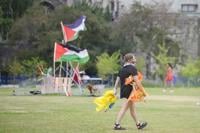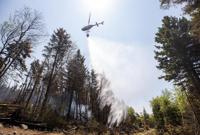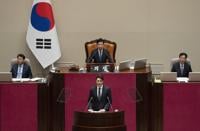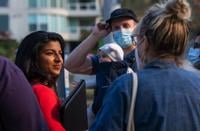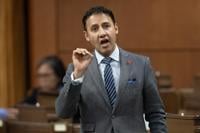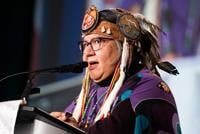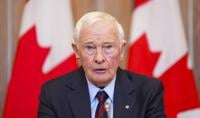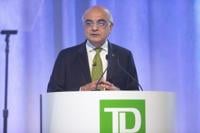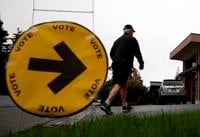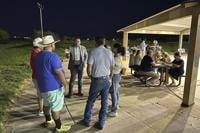TORONTO - A pro-Palestinian protest encampment that stood for weeks at the heart of the University of Toronto may now be gone, but experts say the court ruling that led to its clearing could have lingering effects for future protests on post-secondary campuses in Canada.
Last week, a judge authorized police to take action if protesters didn't leave the encampment site by a set deadline. The protesters complied but promised to keep putting pressure on the university in other ways to push their demands, which include disclosing and divesting from investments in companies profiting from Israel's offensive in Gaza.
Several similar encampments at other Ontario universities have since been dismantled, some under threat of legal action.
While each case is different, experts say the U of T court ruling raises questions about balancing free expression and property rights at academic institutions while possibly setting a precedent for how future campus protests are handled.
"It’s well worth thinking about why universities are considered private landowners when their purpose is public,” said Irina Ceric, an assistant law professor at the University of Windsor who researches law and social movements.
"They’re, at least in part, publicly funded. They are spaces meant to be open to community members, both metaphorically but also very clearly, physically. So there was room, I think, to explore that issue."
The University of Toronto turned to the courts in May, after protesters ignored a trespass notice and deadline to clear the encampment set up in an area known as King’s College Circle. The school raised three main objections in its case: it claimed the encampment was violent, associated with antisemitic language and had taken over school property.
Ontario Superior Court of Justice Markus Koehnen ruled in the university's favour.
"Case law is clear that exercising freedom of expression is not a defence to trespass,” he wrote. "The university has suffered irreparable harm because of the protesters’ continued appropriation of front campus and the exclusion of others from front campus.”
The order did not take away the protesters’ right to demonstrate, Koehnen said, but prevented them from camping, erecting structures, blocking access to university property, or protesting between 11 p.m. and 7 a.m.
The harm to the university – in this case, the loss of control over its property – was greater than the harm to the protestors if the injunction was granted, he found.
The judge also found that the school did not provide sufficient evidence to prove the encampment was violent or associated with antisemitic speech, and the harm in this case rose from the school’s inability to control King’s College Circle.
Koehnen found the school had its own policies that assure free speech on its property, and the encampment prevented others from exercising it because protesters controlled entry to that area of campus "in a way that excludes opposing voices and excludes people who are apolitical and simply want to use front campus as an attractive recreational space."
James Turk, the director of the Centre for Free Expression at Toronto Metropolitan University, said he was “very troubled” by the reasoning behind the ruling.
While the judge was correct to address the lack of evidence behind allegations of antisemitism and violence, the ruling's characterization of the encampment and its occupation of space was problematic, he said.
“It demeans the seriousness of what protest is, and what free expression is, and ignores the fact that there’s a thousand times more land around the university ... it’s not like they were occupying,” Turk argued, adding there is "no shortage" of alternative space for counterprotests or other activities on campus.
Turk said he found the ruling particularly concerning because post-secondary schools are a hub for criticism, theory and discussion, and those participating in the encampment were "unquestionably" exercising their right to free expression and assembly.
“The university is generally a context that’s the freest of any in our society for expressive rights, whether it be the academic freedom of the faculty, or the general freedom of expression of the students, staff,” said Turk.
“Without that, you really don’t have a university.”
The ruling, Turk argued, could have harmful implications for future protests.
"This decision will reinforce restrictive approaches that will harm freedom of expression at other universities, or will make it possible for people to argue for more restrictive expressive freedom practices," he said.
In the ruling, Koehnen said the Charter does not apply to the university because it is not “governmental in nature,” nor are its actions towards the encampment. He also said the Charter doesn't protect trespass.
Bruce Ryder, a professor at York University’s law school, said the ruling placed a reasonable limit on the right to protest, but highlights an ongoing debate about how and when the Charter is applied to universities.
“The problem with saying that the Charter doesn’t apply – and the reason why the university argued for it not to be bound by the Charter – is it leaves them the option of imposing unreasonable limits on protest,” Ryder said.
"That’s not a healthy thing for campus life or for our democracy.”
The courts should work to develop an understanding of universities as “distinct spaces” that are not entirely private nor public, said Ryder.
What emerges from the story of encampments across the country is the question of who makes up a university, Ryder said.
In the U of T case, although the university is legally the property owner, Ryder said there’s a greater conversation to be had about the role of faculty, staff and students in the school’s identity.
“I find it upsetting to read an opinion, to hear about a trespass notice or an opinion that refers to the university and collapses (it) into its governing council," Ryder said. "The university also consists of the people who are being asked to leave."
This report by şĂÉ«tvwas first published July 11, 2023.


